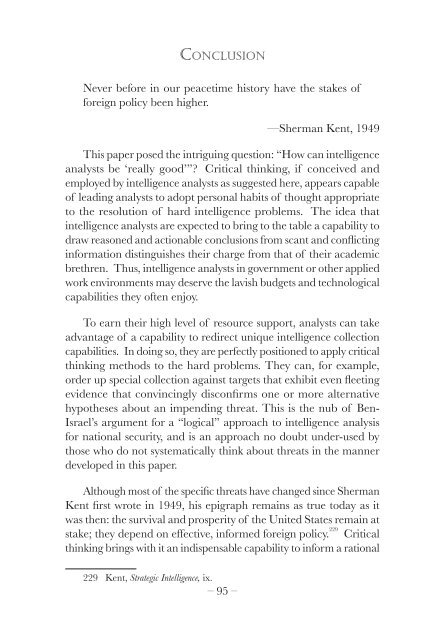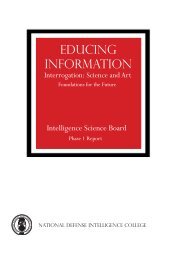Critical Thinking and Intelligence Analysis
Critical Thinking and Intelligence Analysis
Critical Thinking and Intelligence Analysis
You also want an ePaper? Increase the reach of your titles
YUMPU automatically turns print PDFs into web optimized ePapers that Google loves.
Conclusion<br />
Never before in our peacetime history have the stakes of<br />
foreign policy been higher.<br />
229 Kent, Strategic <strong>Intelligence</strong>, ix.<br />
– 95 –<br />
—Sherman Kent, 1949<br />
This paper posed the intriguing question: “How can intelligence<br />
analysts be ‘really good’” <strong>Critical</strong> thinking, if conceived <strong>and</strong><br />
employed by intelligence analysts as suggested here, appears capable<br />
of leading analysts to adopt personal habits of thought appropriate<br />
to the resolution of hard intelligence problems. The idea that<br />
intelligence analysts are expected to bring to the table a capability to<br />
draw reasoned <strong>and</strong> actionable conclusions from scant <strong>and</strong> conflicting<br />
information distinguishes their charge from that of their academic<br />
brethren. Thus, intelligence analysts in government or other applied<br />
work environments may deserve the lavish budgets <strong>and</strong> technological<br />
capabilities they often enjoy.<br />
To earn their high level of resource support, analysts can take<br />
advantage of a capability to redirect unique intelligence collection<br />
capabilities. In doing so, they are perfectly positioned to apply critical<br />
thinking methods to the hard problems. They can, for example,<br />
order up special collection against targets that exhibit even fleeting<br />
evidence that convincingly disconfirms one or more alternative<br />
hypotheses about an impending threat. This is the nub of Ben-<br />
Israel’s argument for a “logical” approach to intelligence analysis<br />
for national security, <strong>and</strong> is an approach no doubt under-used by<br />
those who do not systematically think about threats in the manner<br />
developed in this paper.<br />
Although most of the specific threats have changed since Sherman<br />
Kent first wrote in 1949, his epigraph remains as true today as it<br />
was then: the survival <strong>and</strong> prosperity of the United States remain at<br />
stake; they depend on effective, informed foreign policy. 229<br />
<strong>Critical</strong><br />
thinking brings with it an indispensable capability to inform a rational
















